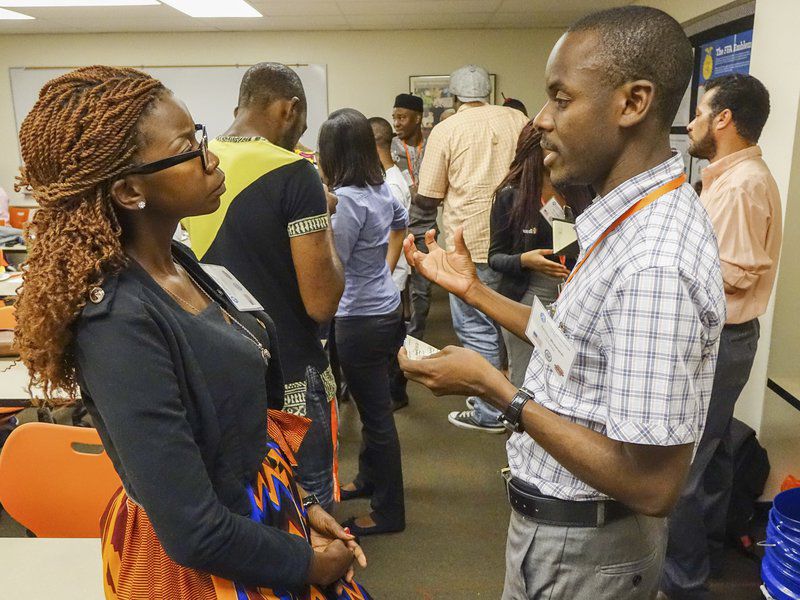By David Bitton
Stillwater NewsPress, Okla.
WWR Article Summary (tl;dr) The Mandela Washington Fellowship for Young African Leaders, which began in 2014, is designed to empower young leaders from sub-Saharan Africa through academic coursework, leadership training and networking opportunities.
Stillwater NewsPress, Okla.
Twenty-five young business professionals and leaders from 18 African countries kicked off their six-week Mandela Washington Fellowship Monday at Oklahoma State University.
Fellows will focus on learning about business and entrepreneurship while working with the College of Agricultural Sciences and Natural Resources and the Riata Center for Entrepreneurship in the Spears School of Business.
The fellows are among more than 1,000 African participants being hosted at 38 U.S. universities.
“As a flagship program of the Young African Leaders Initiative, the Mandela Washington Fellowship for Young African Leaders, which began in 2014, is designed to empower young leaders from sub-Saharan Africa through academic coursework, leadership training and networking opportunities,” an OSU press release said.
The fellows are staying on the OSU campus.
Craig Watters, executive director of the Riata Center for Entrepreneurship, said he looks forward to learning about the fellows’ businesses.
“You all have a business or business dream,” Watters said. “We will help you develop your business.”
That was good news to Regis Ezin, 31, of Benin, who wants to expand his snack food business to a larger audience.
Ezin said his business takes traditional recipes and modernizes them, creating African snacks all can enjoy.
He said his business is the first in West Africa to incorporate resealable zipper packaging.
Dorcas Maliro, 27, of Malawi, and Sandiso Mkwananzi, of Zimbabwe, got to know each other while talking about their businesses.
Maliro grows mushrooms and works with rural women and youth, discussing agriculture production.
Mkwananzi coaches local startups for people ages 12-30 and helps to develop their ideas and make them better entrepreneurs.
Manuela Pacutho, 31, of Uganda, is founder of a 24-hour infant and toddler child care facility.
“My friends call me ‘baby mama,'” she said.
The first-of-its-kind facility also has a curriculum program to help prepare youngsters for school, according to Pacutho.
“If I don’t raise them now, I don’t know what will happen to my country a few years from now,” Pacutho said.
Another reason for opening the child care facility was to give mothers the chance to work, Pacutho said.
Pacutho said only between 27-39 percent of the workforce in her country are women. And with 75 percent of the population under age 30 and many women busy having children, the percentage of working women isn’t going up, Pacutho said.
“I want to help women with career advancement,” Pacutho said.
Ivon Gbeto, 29, of Benin, who owns a restaurant and cell phone business, is excited to network with American and African leaders.
He wants to improve his restaurant business and learn to become his own food supplier.
Tatiana Mbang Nsue Asangono, 30, of Equatorial Guinea, runs a wholesale store supplying retail businesses with basics like frozen meat, soap, batteries, oil and toilet paper.
Asangono is hopeful networking with other fellows will lead to new suppliers and more business.
“I hope to get knowledge and skills and have more innovative ideas for my business,” she said.
Rob Terry, professor and head of the Agricultural Education, Communications & Leadership department, said the fellows will make life-long friendships over the next six weeks.
Colleague Craig Edwards agreed.
“It’s really about building relationships,” Edwards said in a press release. “We’ve been involved with several programs from this part of the world and each one of them has been extremely beneficial in their own right. The African students learn a great deal about how things are done over here, but we learn just as much from them during their visits.”
Edwards walked the fellows across campus Monday morning, stopping at a statue of past President Henry Bennett.
“International work and development at OSU starts with Dr. Bennett,” Edwards said.
Edwards hammered home Bennett’s critical role in international development.
Watters spoke about the importance of relationship building and how OSU students want to do global work and how this fellowship gives them that chance.
“We are excited to be able to host this event at OSU and are confident our curriculum will allow for them to understand how their businesses can be sustainable back home,” Watters said in a press release. “They will be coming with business plans, which we will critique and provide feedback with they idea of improving their lives and the lives of those in their communities.”
The young African leaders were able to come to Stillwater thanks to Richie Roberts, a PhD students in the Agricultural Education, Communications and Leadership department.
Roberts wrote a grant, which the U.S. Department of State supported.
The fellows hope to interact with area businesses as much as possible during their time in Stillwater.
If any Payne County business owners or entrepreneurs are interested in connecting with the fellows they can reach out to Edwards at 405-744-8141.
The fellows have several site visits planned, including touring Meridian Technology Center on Tuesday.
At the end of July the fellows from OSU will meet up with all other fellows in Washington, D.C. for the Mandela Washington Fellowship Summit before heading home.














































































































































































































































































































































































